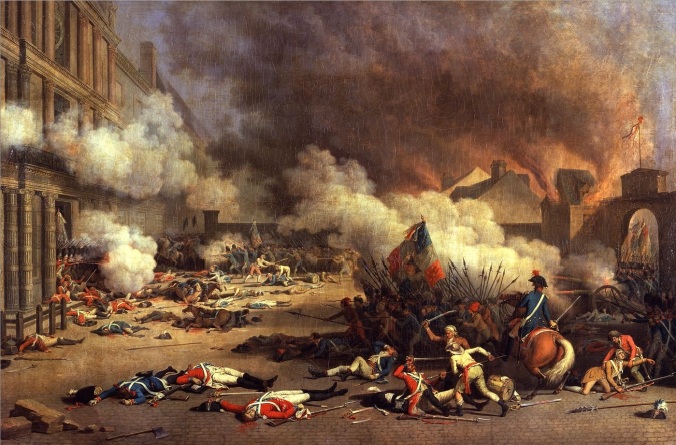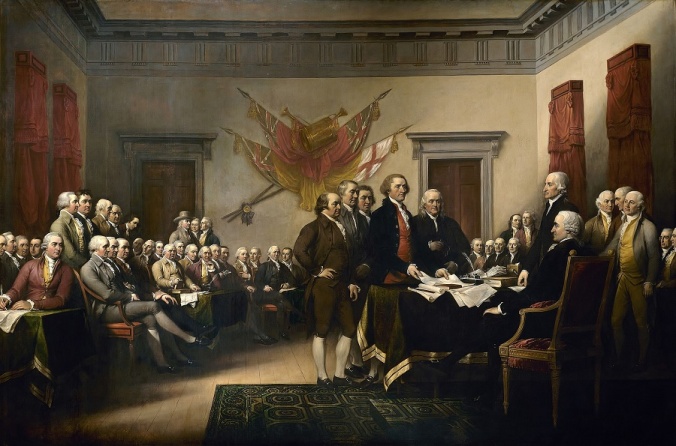
In my last post, I noted that the conservative political thinker Edmund Burke wrote a rather scathing appraisal of the French Revolution. This came as a bit of a shock to both the French philosophes and Burke’s own allies in the Whig Party who favored the revolution. After all, given that he defended the American Revolution, wasn’t he in fact betraying his own beliefs when stating phrases like:
The effect of liberty to individuals is that they may do what they please; we ought to see what it will please them to do, before we risk congratulations which may be soon turned into complaints.
However, in point of fact Edmund Burke never “defended the American Revolution.” What he did do was argue the Legitimacy of their grievances – that the American colonists were standing up for their rights as Englishmen. He counseled his fellows in Parliament to:
Let the colonies always keep the idea of their civil rights associated with your government – they will cling and grapple with you, and no force under heaven will be of power to tear them from their allegiance. But let it be once understood that your government may be one thing and their privileges another, that these two things may exist without any mutual relation, the cement is gone, the cohesion is loosened, and everything hastens to decay and dissolution.
And here we see a demonstration of his conservative philosophy – the respect for traditions and conventions coupled with a pragmatic sense of politics.
Burke’s speeches in Parliament were printed and received with much acclaim in the American Colonies precisely because many felt they were still in fact Englishmen fighting against a tyrannical king.
And that leads to the bigger question – just how “revolutionary” was the American War of Independence?
Compare the American experience with the Russian and French Revolutions. There are in fact significant differences. The French and Russian Revolutions aimed at a transformation that would re-order the foundations of society in a manner that had never been tried before. In a sense, both French philosophes and Marxist ideologues truly believed that with enough effort and resources they could rewrite human nature. In one fell swoop, they intended to usher in a new golden age while banishing superstition and regressive causes to the dust bin of history.
The American Revolutionaries however, decided to wage war against Great Britain for the high minded cause of……taxation.
To put this into context we must remember that England had recently fought the French and Indian War on behalf of their American colonies. Although they had achieved victory, we should note the old adage that victory can be quite expensive. It seemed reasonable to the government of Great Britain that the Americans should pay their fair share of the war costs.
The Colonists had a different perspective. From the outset, the American Revolutionaries strongly identified their positions with the Whig party against the monarchy and Tories. Part of this strong animus came from the fact that the important officials of the colonies – governors, judges, and custom house officials owed their livelihood and thus their loyalty directly to the Crown.
The Stamp Act only made matters worse. Now the colonists were essentially being told that they could not participate in the process of assigning taxes that they would eventually have to pay for. Hence the cry of “no taxation without representation.” Many thought that their rights as Britons were being violated.
We should stop on that point and think about that for a second…… their rights as Britons were being violated.

This would be a good time to recall the character of the men who led the War of Independence. They were lawyers, merchants, planters, and officers in the colonial army. They comprised the elite society of the colonies and were educated in a manner similar to their counterparts in England.
As such, they were raised in a belief that a golden age of freedom had existed prior to the Norman Conquest of the Anglo-Saxons in 1066. They clung to the idea, like all educated Britons of their time, that this freedom was fully restored by the Glorious Revolution of 1688. A person can even make the argument that the American revolutionaries believed themselves to be defending a fundamental tradition of freedom from an innovating monarch whose actions looked like the first steps toward autocratic tyranny.
It is no surprise than that a Founding Father like Patrick Henry could invoke the phrase, “Give me Liberty or Give me Death,” for he would be making that appeal within the context of the British traditions of limited government and personal freedom – the fruits of the Glorious Revolution.
And so the American Revolution, although containing radical elements, was by most standards a rather orderly and procedural affair led by a political elite that wanted to reassert their lost rights.
It was only after the decision had been made to create a Declaration of Independence that one could say a new course was being charted….and even then…the inclination of the Founding Fathers was to look back in the past toward Classical sources that spoke of the successes of the Roman Republic.